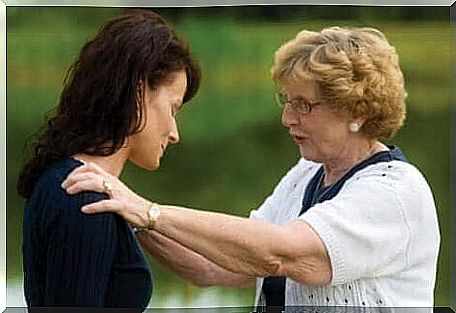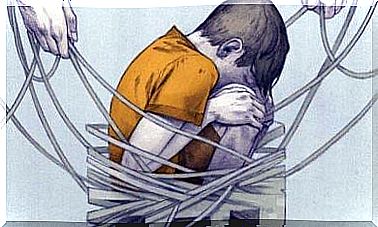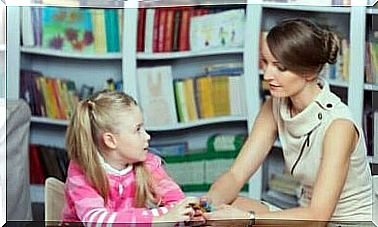Parental Psychological Abuse Of Adult Children

The psychological abuse of parents towards adult children is a reality for many. Manipulation, blackmail, words that hurt and offend, those comments that continue to feed the same sense of insecurity these people have experienced in childhood… Sometimes even in adulthood, these bonds fail to break or repair, creating a path to the same dynamics that lower a person’s self-esteem and even quality of life.
Some conditions in our society remain invisible to others. Psychological abuse takes many forms and falls on the shoulders of many types of victims. There are the elderly who suffer from the abuse of their own children, there are children who suffer from the effects of toxic parenting and there are those men and women who have already reached adulthood and moved into their own homes but still suffer from the aggressive treatment of father, mother or both parents.
What can be done in these cases? Emphasizing the role of social services or other agencies in such circumstances is a mere irony to many. What is the point of raising a topic that you have had to live with all your life? Some people simply do not see anything to be saved in these circumstances, but have embraced the problem and continue to interact daily in the shadow of their parents ’abuse.
In these circumstances, one obvious thing arises: there is a perpetual bond between the abuser and the victim that feeds addiction, fear, and even affection, which is not a healthy affection in its ultimate sense, but rather a toxic love between parents and adult children. However, these situations often occur, persist, and become chronic.
The implications of such realities are enormous. Let us now delve into the problem in a little more detail.

Psychological abuse of parents towards adult children – what does it mean?
We can define psychological abuse or abuse as behavior designed to control and subjugate another person through fear, manipulation, humiliation, intimidation, projection of guilt, pressure, coercion, and even constant resentment.
These various forms of aggression do not leave marks on the skin, but they damage a person’s psychological integrity. The effect, for example, in the case of young children can be devastating. If this type of abuse is maintained for decades to come, we can only imagine the seriousness of this emotional wound and its implications for fundamental human aspects such as self-esteem, one’s own identity, and a personal sense of security.
Parental psychological abuse of adult children does not manifest overnight. It responds to the dynamics that originate and begin as early as childhood. It explains why many people reach adulthood with such a harsh emotional mindset, as these people have suffered in their childhood from the psychological abuse of their parents that leaves many in the shadows of post-traumatic stress disorder.
What is most striking in this situation, however, is that people who have been subjected to this psychological abuse often do their best to appear completely normal. Very few people close to these victims know these facts. In some cases, even the close friends of the victims are never allowed to know about this problem and these circumstances, which are hidden and hidden behind closed doors.
When the monsters are their own parents and we normalize psychological abuse
When we say that parental psychological abuse of adult children is common, the first thing that certainly comes to mind for many of us is the question of why this happens. How can anyone endure such treatment for the rest of their lives? Wouldn’t it be better to distance ourselves from such people or break ties with these abusers forever?
The answer is not simple, as the connection between the victim and the abuser is hugely complex. Sometimes, even if someone has to live in these unfavorable circumstances along with anxiety, fear, humiliation, and contempt, one can still love those who harm us. Because it’s about our own father or mother, and because we don’t know anything better, many of these facts “normalize”.
While adult children endure and persevere in this dichotomy that runs between affection and fear, love, and hate, parents who mistreat their children do not change just because the child has grown into an adult. Contempt, criticism, humiliation, and emotional manipulation continue to be useful tools for them in controlling and exercising power.
Monsters don’t become beauties over the years. In general, such people still need their power and authority because they are part of their personality and essence.
Psychological abuse of parents towards adult children: what is its effect?
One of the consequences of mental abuse experienced in childhood is the development of post-traumatic stress disorder in adulthood. Indeed, studies at the University of Utrecht and the University of Coimbra in Portugal have shown how significant this relationship is.
Thus, parental psychological abuse of adult children usually has the following consequences:
- Problematic and emotionally unsatisfactory relationships.
- Low self-esteem, uselessness, destruction of pride, loss of personal sense of security, lack of motivation…
- Emotional oppression, tendency to hide one’s own feelings.
- Other effects such as anxiety, stress and sleep disorders.

What can be done in these situations?
If, in these circumstances, one priority should be raised, it is the fact that the adult child should be fully aware of this abuse and of the need to find a solution to the situation. This problem often involves dependence on one’s own parents, both emotionally and financially, as many adults, for example, cannot cope with daily expenses without parental financial support.
Similarly, even if the connection between the victim and the abuser is financially independent, toxic behavior still exists, but in this sense buried, for example, through manipulation, criticism of every decision made, or the partner chosen. It is necessary to understand that these situations cannot and must not continue.
In the face of this reality, there are only two options: to make the facts clear to the parents and sever the relationship with them permanently, or to take distance from them and reduce interaction as needed.
Adult children who have been subjected to parental abuse also need psychological help. All those suffering and humiliation experienced over the decades leave a deep wound that needs to be addressed. The goal is to restore one’s self-esteem and personal sense of security to build one’s own, independent, mature and happy life.









